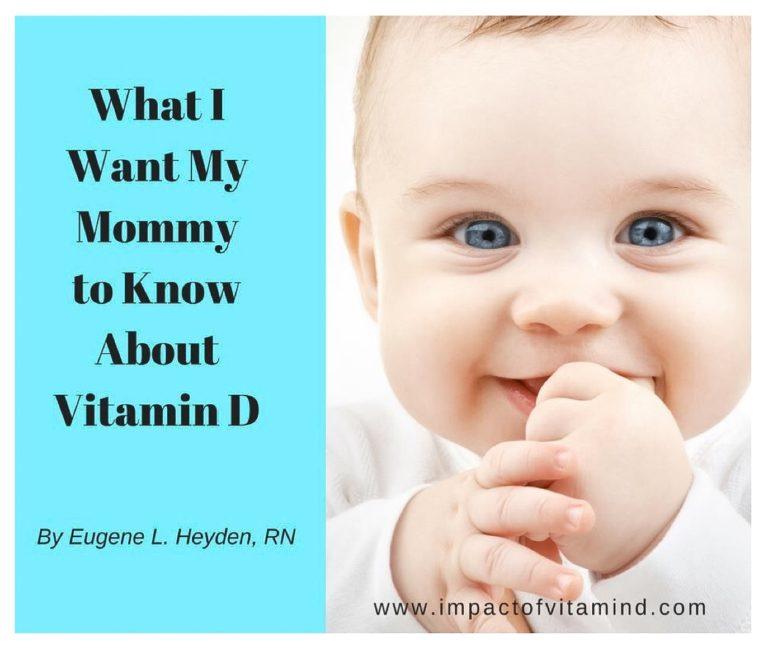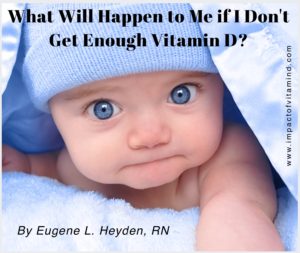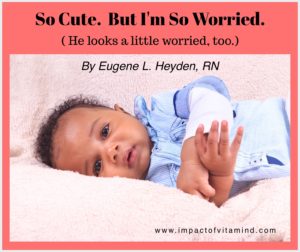What I Want My Mommy to Know About Vitamin D

Last update: 09-14-22
By Eugene L. Heyden, RN
I guess, the first thing I want Mommy to know is that vitamin D is necessary for my proper growth, for my neurological development, and for defense against disease . . . and it must be in adequate supply or you can just go ahead and place me in that box filled with other vitamin D deficient babies who will struggle as they stumble through this life. It is a very big box.
The next thing I want my Mommy to know is that she will have to do things a little differently from now on if she plans on making me vitamin D sufficient and better able to deal with what life has to throw at me. It takes thousands of International Units (IU) of vitamin D, taken or created per day, for adequate amounts to appear in her breast milk. I’m relying on her for this. She is my best and only real hope. But I’m afraid she is listening to the voices of others.
The current recommendations for vitamin D supplementation for nursing mothers are clearly not up to the task. Only 400, perhaps 600 IU per day! Are you kidding me?!! Without any significant amount of sunlight exposure—the way mommies and babies have been making vitamin D throughout the ages—I am sure to stay inside the great big box of struggling babies who are vitamin D deficient. Some of them will die, traceable to vitamin D deficiency. With respect to my vitamin D status, I would probably be better off living the life of a third-world baby, basically naked, playing in the dirt, but creating generous amounts of vitamin D. But don’t tell Mom I said this. Have you noticed how much time I spend indoors? And Mommy, she is just too busy to get outdoors during the time of day when she would generate enough vitamin D to make us both vitamin D sufficient. I doubt if she knows that she can only make relevant amounts of vitamin D between the hours of 10:00 AM and 3:00 PM, and only during the days between mid-Spring and early Fall. I don’t even know this!
Please tell Mommy (before it is too late) that if she can’t make it, I’ll have to take it. Do you think she knows how much vitamin D I’ll need to protect me from type I diabetes, multiple sclerosis, Crohn’s disease, schizophrenia, and unbelievable amounts of snot and an earache or two? I think not. Let’s give her an idea of what it will take.
Some 50 years ago, an experiment was conducted. Lots of cute little babies (like me) were given 2,000 IU vitamin D per day during their first year of life. They were followed for 30 years. Surprisingly, this group of babies, turned into adults, had an 80% less chance of contracting type I diabetes. And the boys had a 77% less chance of developing schizophrenia. And then there is multiple sclerosis. This disease scares the hell out of me.
Multiple sclerosis is another disease I need to be protected from. Mommy is not concerned; she just can’t imagine I would come down with this dreadful disease! But I can—particularly so if I live the vitamin D deficient life. Until very recently, multiple sclerosis was practically nonexistent in populations who near the equator, a place where generous amounts of sunshine create generous amounts of vitamin D. Perhaps not surprisingly, the chance of contracting multiple sclerosis progressively increased the further a person lives from the equator. Clearly, vitamin D deficiency makes one more vulnerable to this horrible disease. Of course, things are changing. With the increased availability of air conditions worldwide, people living near the equator stay indoors a lot more than they used to, generate less vitamin D as a result, and are more at risk of contracting multiple sclerosis.
Speaking of dreadful diseases (that scare the hell out of me), Crohn’s disease is no picnic. My risk of contracting this disease is greatly elevated if I remain vitamin D deficient. Do I look like I need this disease? Of course not. Please tell Mom I don’t need this disease. She loves me. I know she will do her best to protect me from this evil.
I certainly want my Mommy to know that she will probably need at least 6,000 IU of vitamin D, taken daily in addition to what can be found in her multivitamin, for her breast milk to satisfy my need for vitamin D. Alternatively, I’m thinkin’ (and so are the scientists) that I will need to ingest at least 1,000 IU, perhaps 2,000 IU per day, of vitamin D to meet my needs—but I’ll be glad to take the 400 IU of supplemental vitamin D currently recommended for nursing infants as this is certain to help. Of course, Mommy will need to run any level of vitamin D supplementation by my wellness doctor to make sure there are no contradictions or other reasons of concern.
Finally, tell Mommy I love her. I don’t want the bad things in life to happen to her. The bad things in life, such as diabetes, multiple sclerosis, Crohn’s disease, autoimmune thyroid disease, breast cancer, and so on. These evils happen much more frequently in those who are vitamin D deficient. (Tell her before it is too late.)
Related posts (click image to open)
References
Holick MF 2002 Vitamin D: The Unappreciated D-Lightful Hormone that is Important for Skeletal and Cellular Health. Current Opinion in Endocrinology & Diabetes 9:87–98
Holick MF 2006 Resurrection of Vitamin D Deficiency and Rickets. The Journal of Clinical Investigation 116(16):2062–2072
Hollis BW, Wagner CL, Howard CR, Ebeling M, Shary JR, Smith PG, Taylor SN, Morella K, Lawrence RA, Hulsey TC 2015 Maternal Versus Infant Vitamin D Supplementation During Lactation: A Randomized Controlled Trial. Pediatrics. Oct 1;136(4):625–34
McGrath J, Saari K, Hakko H, Jokelainen J, Jones P, Järvelin M-R, Chant D, Isohanni M 2004 Vitamin D Supplementation During the First Year of Life and Risk of Schizophrenia: A Finnish Birth Cohort Study. Schizophrenia Research 67:3237–324
Munger KL, Levin LI, Hollis BW, Howard NS, Ascherio A 2006 Serum 25Hydroxyvitamin D Levels and Risk of Multiple Sclerosis. JAMA; December 20; 296(23):2832–283
Zittermann A, Schleithoff SS, Tenderich G, Berthold HK, Körfer R, Stehle P 2003 Low Vitamin D Status: A Contributing Factor in the Pathogenesis of Congestive Heart Failure? J Am Coll Cardiol 41:105–112
Acknowledgement
Henry Lahore, vitamin D enthusiast and administrator of www.vitamindwiki.com, offered suggestions that were incorporated into this article.
Copyright © 2016–2022 Eugene L. Heyden, RN
All Rights Reserved
Disclaimer: This article is presented solely for informational purposes. The information contained herein should be evaluated for accuracy and validity in the context of opposing data, new information, and the views and recommendations of a qualified health care professional, and not to be substituted for professional judgment and guidance or to provide reason to neglect or delay appropriate medical care. It is the reader and reader only who bears the responsibility for any actions that could be construed as being a response to the information contained herein. The statements and opinions expressed by the author have not been reviewed or approved by the FDA or by any other authoritative body, nor is the author endorsing any product or specific therapy. This article is offered to the reader to broaden his or her understanding of the issues discussed and to help identify options that may be suitable for the individual to pursue, on behalf of self or others, under approval and direction of a qualified physician. The author and publisher offer no guarantees of the accuracy or validity of the quotations incorporated into this article or the accuracy or validity of the information presented by the resources that are herein recommended.



